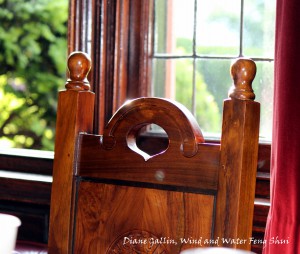Feng Shui and Windows
Feng Shui and Windows
Have you ever counted the number of doors and windows in your home or business? If not, you might want to do so. It’s one of the first things I notice in my work because they impact every resident of a home and employee of a business and are big contributors to achieving goals. Windows and doors represent different energies in Feng Shui, and a good ratio is three windows to each exterior door.
We hear lots of advice about the visibility, approach and main entrance of the buildings we spend time in. The front door is considered to be the mouth of ch’i, where all benevolent energy finds its way into the space. Not only do doorways provide the threshold between a person or organization’s public and private lives, once inside a building, interior doors represent the transition spaces between rooms or departments within a business. They quietly prepare dwellers to adjust their behavior by allowing time to pause and adapt, announcing the change between one room’s function and another. An open door invites conversation in an office and welcomes friends and family into a home, while a closed door sends the message that we’re too busy, so please stay away.
In Feng Shui, exterior doors are linked to the voice of the adults in a family or owners of a business and create an expectation for the visitor to discover what lies beyond.
But windows in a building are equally as important. They represent our connection to the outside world and help clarify our vision of the future. More transparent than doors, windows keep us tethered to the ever-changing natural environment, even as we separate ourselves from it. Green spaces, moving water, human and animal activities, weather patterns and traffic viewed through a window remind us of alternatives to daily tasks and permanent surroundings. The briefest glance through a window to blue skies or a bird in flight inspires optimism and innovative thinking.
Outdoors, the light and seasons change, trees grow and water ebbs and flows. All the while, our indoor spaces stay the same. Unlike doors, windows provide a constant opportunity to exchange information with the outside world that is missing in permanent structures. While darkened windows help minimize distractions and lull us to sleep, open windows connect the human body’s biological rhythms to nature’s own cycle of day and night, regulating functions via the circadian clock. By offering ever-changing views of the same scene, windows also give us the opportunity to consider different options and opinions. This exchange of energy and ideas also prevents feelings of isolation.
In Feng Shui, windows are linked to the voice of children and all their future-oriented hopes and dreams. Likewise, our own creative ideas are gifts of an open window.
When you have a moment, check all the windows in your home, office or business for those that might be blocked, broken, stuck or less than crystal clear. Trim any overgrown landscaping that blocks your vista and keep shades and curtains open during daylight hours. Like human eyes, windows can only relay clear information to you if they are open.
Wishing you clear vision, creative ideas and good ch’i,
Diane Gallin, CFSC



